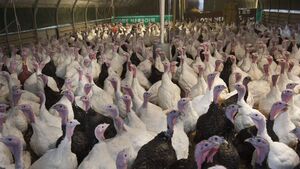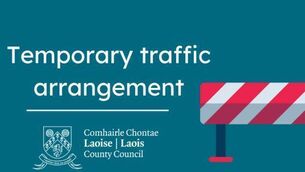Bird flu found on turkey farm in County Carlow

Illustration purposes only
Minister for Agriculture, Food and the Marine, Martin Heydon TD, has announced the introduction of a compulsory housing order for poultry and captive birds, to protect them from the risk of avian influenza. The new rules will come into effect on Monday 10 November 2025.
This is following an outbreak of the bird flu in a commercial flock of turkeys on a poultry farm in County Carlow.
The Minister said: “Due to the increased risk of avian influenza to our poultry, I am taking action to reduce the threat to our industry and to our poultry farmers’ livelihoods. Poultry and captive birds must, from Monday 10 November, be housed or confined in such a manner that they do not have access to other poultry, captive birds, or wild birds. Reducing the opportunity for contact with potentially infected wild birds, is crucial as this is one of the main ways in which the virus can spread.” The Minister emphasised the importance of biosecurity: “Biosecurity remains the single most effective way to prevent the virus spreading from wild birds into poultry, or between poultry flocks. All those who have poultry or kept birds must take strict precautions and exercise the highest standards of biosecurity to protect their flocks from the threat of avian influenza, and to protect the poultry sector in Ireland.” Minister Heydon added: “There has been strong and ongoing cooperation between my Department and The Department of Agriculture, Environment and Rural Affairs in Northern Ireland on this issue. Minister Muir is introducing a similar order in Northern Ireland.” Strict new biosecurity regulations for poultry were introduced at the start of November S.I. No. 520/2025 (Avian Influenza (Biosecurity measures) Regulations) in response to the increased risk posed to Irish poultry flocks by the presence of avian influenza virus in wild birds in Ireland. The compulsory housing order is an additional risk mitigation measure.
Members of the public are advised not to handle sick or dead wild birds and to report any episodes of sick or dead wild birds to their Regional Veterinary Office or, if outside business hours, to contact the National Disease Emergency Hotline on 01 492 8026. The department continues to closely monitor and assess the disease situation and is in regular contact with industry stakeholders and counterparts in Northern Ireland.
Further information, including a detailed technical update, is available at gov.ie/birdflu.
An outbreak of bird flu was confirmed at a commercial turkey flock in Co Carlow.
In a statement, the Department of Agriculture, Food and the Marine said a 3km protection zone and 10km surveillance zone have been put in place in the area.
The Minister for Agriculture, Martin Heydon, said: “Strict biosecurity is the best defence we have against the threat of avian influenza.
“Thankfully, the disease poses no food safety risk to consumers of well-cooked poultry products, including eggs.” The virus, which causes the disease, is known as HPAI H5N1 and has been in circulation among wild birds over the past year.
On Tuesday, Fota Wildlife Park in Cork confirmed it will remain closed to the public until at least the end of November after an outbreak among its animals.
Avian influenza can be very contagious between birds, but health authorities have advised that the risk to public health from the strain of Avian Influenza currently circulating is very low.
But they have warned members of the public not to handle dead or sick birds and, instead, to report them via the Department’s avian check app.
Compulsory biosecurity measures have been in effect since Saturday and require keepers of all captive birds to implement the specific procedures, regardless of the size of their flock.
Additional enhanced biosecurity measures must be implemented in flocks of 350 birds or more.
All bird owners are being warned to be vigilant for signs of disease in their flocks, which vary between species but can include: swollen head; discolouration of neck and throat; loss of appetite; respiratory distress; diarrhoea; and fewer eggs laid.
If flu is suspected, owners should notify the nearest Regional Veterinary Office or ring the Avian Influenza Helpline on 01 607 2512.
June Fanning, Chief Veterinary Officer at the Department of Agriculture, has said that strict biosecurity is ”really, really important” for the poultry industry.
Dr Fanning told RTÉ radio’s Morning Ireland that biosecurity was the best protection during the current bird flu outbreak.
Actions such as changing footwear and clothes before interacting with birds, feeding commercial birds away from wild birds, reducing interaction between wild birds and “kept” birds, were important as were cleaning and disinfection of vehicles and reducing the number of visitors.
“The currently circulating strain of bird flu is of low risk to humans, so that is good news but the advice still is that if people come across sick or dead wild birds or if they've poultry themselves that are sick, not to touch or interact with the birds because there is that human health risk, however low.





